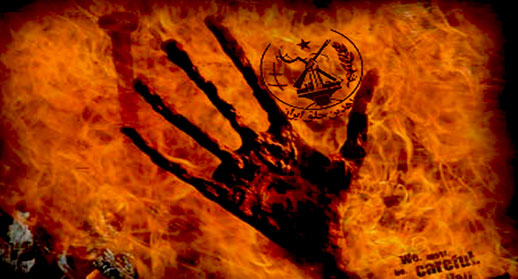| The anti-Iran terrorist Mojahedin-e Khalq Organization (MKO) and the British Broadcasting Corporation (BBC) have been in tight cooperation in recent months to fabricate and spread fake reports on Iran in a bid to spark tension and crisis in the country, Habilian Association reported. |
 http://english.farsnews.com/newstext.php?nn=8912180825
http://english.farsnews.com/newstext.php?nn=8912180825
According to a report published by the website of the Habilian association - a human rights group formed of the family members and relatives of the Iranian victims of terrorism - the US and British radio and television networks, in an orchestrated move with the MKO, are desperately trying to spread fake and fabricated news to portray Iran as a country in tension and chaos.
The website added that the multifaceted cooperation has been broadened by the western media after their similar efforts to spark tension and unrests in Iran failed and led to the further unity among the Iranian nation. The Habilian website added that in some cases the MKO members have sent out-dated pictures and footages of unrests in Iran or other neighboring countries to the BBC, trying to pretend that those footages had been taken from new unrests in Iran.
Earlier this month, reliable sources said that reports about the detention of opposition leaders by the Iranian government are false and have been fabricated and released by the members of the MKO in a move to stir unrests in Iran. Jodashodegan website, a website affiliated to the defected members of the MKO, quoted sources privy to MKO headquarters in Paris as saying that the reports have been fabricated by the MKO's intelligence agents who have infiltrated into the overseas branch of the opposition movement led by Mir-Hossein Mousavi and Mehdi Karroubi.
The Karroubi and Mousavi-led unrests originally started after President Mahmoud Ahmadinejad was re-elected as the next president of the country with over 62% percent of the votes cast in Iran's 10th presidential election in 2009. Both Karroubi and Mousavi have been top officials of the Islamic Republic for year.
Yet, both opposition figures have repeatedly underlined their hatred and disapproval of the MKO since the group has no public support within Iran because of its role in helping Saddam Hussein in the Iraqi imposed war on Iran (1980-1988). The official told FNA that the two men are currently in their houses and Iranian authorities have restricted their contacts merely with some suspected elements. The MKO has sought hard to misuse the occasion after the February 14 unrests in Tehran to practice its seditious plots against the Islamic Republic.
Late in February, sources close to the MKO informed that the terrorist organization had played a key role in the February 14 unrests in the Iranian capital. The MKO has been in Iraq's Diyala province since the 1980s. The MKO, whose main stronghold is in Iraq, is blacklisted by much of the international community, including the United States. Before an overture by the EU, the MKO was on the European Union's list of terrorist organizations subject to an EU-wide assets freeze. Yet, the MKO puppet leader, Maryam Rajavi, who has residency in France, regularly visited Brussels and despite the ban enjoyed full freedom in Europe.
The MKO is behind a slew of assassinations and bombings inside Iran, a number of EU parliamentarians said in a recent letter in which they slammed a British court decision to remove the MKO from the British terror list. The EU officials also added that the group has no public support within Iran because of their role in helping Saddam Hussein in the Iraqi imposed war on Iran (1980-1988). Many of the MKO members abandoned the terrorist organization while most of those still remaining in the camp are said to be willing to quit but are under pressure and torture not to do so.
A May 2005 Human Rights Watch report accused the MKO of running prison camps in Iraq and committing human rights violations. According to the Human Rights Watch report, the outlawed group puts defectors under torture and jail terms. The group, founded in the 1960s, blended elements of Islamism and Stalinism and participated in the overthrow of the US-backed Shah of Iran in 1979. Ahead of the revolution, the MKO conducted attacks and assassinations against both Iranian and Western targets.
The group started assassination of the citizens and officials after the revolution in a bid to take control of the newly established Islamic Republic. It killed several of Iran's new leaders in the early years after the revolution, including the then President, Mohammad Ali Rajayee, Prime Minister, Mohammad Javad Bahonar and the Judiciary Chief, Mohammad Hossein Beheshti who were killed in bomb attacks by MKO members in 1981.
The group fled to Iraq in 1986, where it was protected by Saddam Hussein and where it helped the Iraqi dictator suppress Shiite and Kurd uprisings in the country. The terrorist group joined Saddam's army during the Iraqi imposed war on Iran (1980-1988) and helped Saddam and killed thousands of Iranian civilians and soldiers during the US-backed Iraqi imposed war on Iran.
Since the 2003 US invasion of Iraq, the group, which now adheres to a pro-free-market philosophy, has been strongly backed by neo-conservatives in the United States, who also argue for the MKO to be taken off the US terror list.
